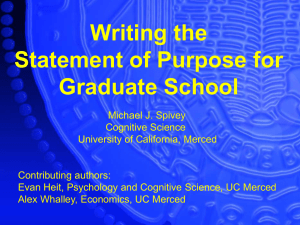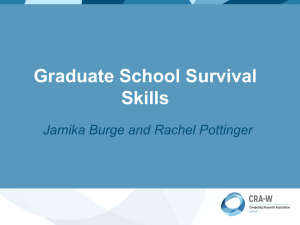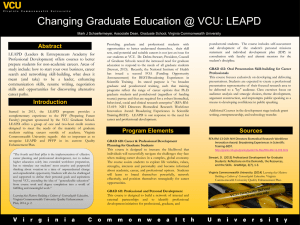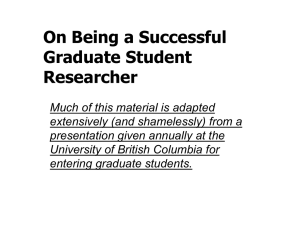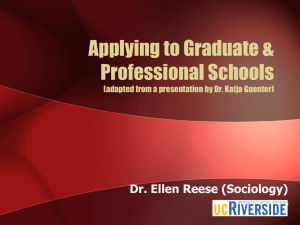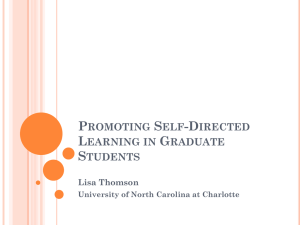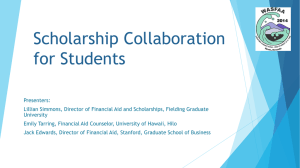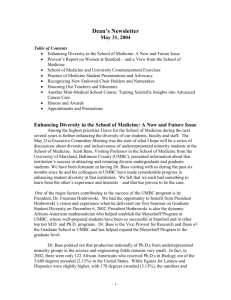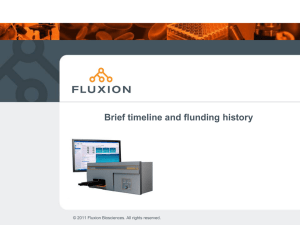the poster - Stanford Biosciences PhD Programs
advertisement
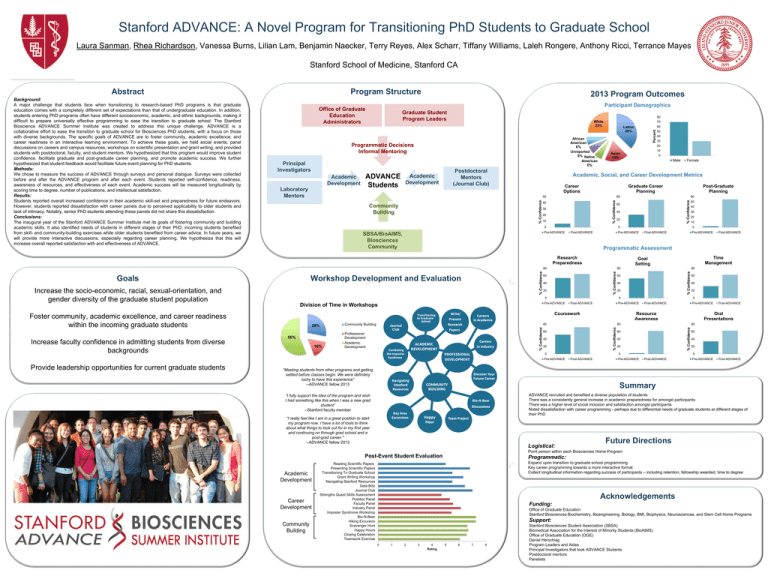
Stanford ADVANCE: A Novel Program for Transitioning PhD Students to Graduate School Laura Sanman, Rhea Richardson, Vanessa Burns, Lilian Lam, Benjamin Naecker, Terry Reyes, Alex Scharr, Tiffany Williams, Laleh Rongere, Anthony Ricci, Terrance Mayes Stanford School of Medicine, Stanford CA 2013 Program Outcomes Participant Demographics Graduate Student Program Leaders 80 White 25% African American 6% Unreported 6% Native American 6% Programmatic Decisions Informal Mentoring Postdoctoral Mentors (Journal Club) Academic Development Laboratory Mentors ADVANCE Students Academic Development Career Options % Confidence 40 30 20 10 60 40 20 Post-ADVANCE Pre-ADVANCE 30 20 10 0 Post-ADVANCE Pre-ADVANCE Post-ADVANCE % Confidence % Confidence 60 40 20 60 40 20 Post-ADVANCE % Confidence 40 20 0 “Meeting students from other programs and getting settled before classes begin. We were definitely lucky to have this experience” --ADVANCE fellow 2013 Post-ADVANCE Post-ADVANCE Oral Presentations 80 60 40 20 0 Post-ADVANCE 20 Pre-ADVANCE 80 60 40 Resource Awareness 80 Professional Development Academic Development 60 0 Pre-ADVANCE Coursework Community Building 80 0 Pre-ADVANCE Division of Time in Workshops Time Management 80 Pre-ADVANCE Provide leadership opportunities for current graduate students 40 Goal Setting 0 16% ç 50 Programmatic Assessment % Confidence Increase faculty confidence in admitting students from diverse backgrounds Post-Graduate Planning 60 0 Pre-ADVANCE Workshop Development and Evaluation 56% Female 80 80 28% Male Graduate Career Planning Research Preparedness Foster community, academic excellence, and career readiness within the incoming––graduate students 0 Academic, Social, and Career Development Metrics SBSA/BioAIMS, Biosciences Community Increase the socio-economic, racial, sexual-orientation, and gender diversity of the graduate student population 30 10 Asian 19% 0 Goals 40 20 50 Community Building 50 % Confidence ç 60 Latino 38% % Confidence Principal Investigators 70 % Confidence Office of Graduate Education Administrators % Confidence Background: A major challenge that students face when transitioning to research-based PhD programs is that graduate education comes with a completely different set of expectations than that of undergraduate education. In addition, students entering PhD programs often have different socioeconomic, academic, and ethnic backgrounds, making it difficult to prepare universally effective programming to ease the transition to graduate school. The Stanford Bioscience ADVANCE Summer Institute was created to address this unique challenge. ADVANCE is a collaborative effort to ease the transition to graduate school for Biosciences PhD students, with a focus on those with diverse backgrounds. The specific goals of ADVANCE are to foster community, academic excellence, and career readiness in an interactive learning environment. To achieve these goals, we held social events, panel discussions on careers and campus resources, workshops on scientific presentation and grant writing, and provided students with postdoctoral, faculty, and student mentors. We hypothesized that this program would improve student confidence, facilitate graduate and post-graduate career planning, and promote academic success. We further hypothesized that student feedback would facilitate future event planning for PhD students. Methods: ç We chose to measure the success of ADVANCE through surveys and personal dialogue. Surveys were collected before and after the ADVANCE program and after each event. Students reported self-confidence, readiness, awareness of resources, and effectiveness of each event. Academic success will be measured longitudinally by scoring time to degree, number of publications, and intellectual satisfaction. Results: Students reported overall increased confidence in their academic skill-set and preparedness for future endeavors. However, students reported dissatisfaction with career panels due to perceived applicability to older students and lack of intimacy. Notably, senior PhD students attending these panels did not share this dissatisfaction. Conclusions: The inaugural year of the Stanford ADVANCE Summer Institute met its goals of fostering community and building academic skills. It also identified needs of students in different stages of their PhD; incoming students benefited from skill- and community-building exercises while older students benefited from career advice. In future years, we will provide more interactive discussions, especially regarding career planning. We hypothesize that this will increase overall reported satisfaction with and effectiveness of ADVANCE. Program Structure Percent Abstract 60 40 20 0 Pre-ADVANCE Post-ADVANCE Pre-ADVANCE Post-ADVANCE Summary “I fully support the idea of the program and wish I had something like this when I was a new grad student” --Stanford faculty member ADVANCE recruited and benefited a diverse population of students There was a consistently general increase in academic preparedness for amongst participants ç There was a higher level of social inclusion and satisfaction amongst participants Noted dissatisfaction with career programming - perhaps due to differential needs of graduate students at different stages of their PhD ç “I really feel like I am in a great position to start my program now. I have a lot of tools to think about what things to look out for in my first year and continuing on through grad school and a post-grad career." --ADVANCE fellow 2013 Logistical: Future Directions Point person within each Biosciences Home Program Post-Event Student Evaluation –– Academic Development Career Development Community Building Programmatic: ç Expand upon transition to graduate school programming Key career programming towards a more interactive format Collect longitudinal information regarding success of participants – including retention, fellowship awarded, time to degree Reading Scientific Papers Presenting Scientific Papers Transitioning To Graduate School Grant Writing Workshop Navigating Stanford Resources Data Blitz Journal Club Strengths Quest Skills Assessment Postdoc Panel Faculty Panel Industry Panel Imposter Syndrome Workshop Bio-N-Beer Hiking Excursion Scavenger Hunt Happy Hours Closing Celebration Teamwork Exercise Acknowledgements Funding: Office of Graduate Education Stanford Biosciences Biochemistry, Bioengineering, Biology, BMI, Biophysics, Neurosciences, and Stem Cell Home Programs Support: 0 1 2 3 4 Rating 5 6 7 8 Stanford Biosciences Student Association (SBSA) ç Biomedical Association for the Interest of Minority Students (BioAIMS) Office of Graduate Education (OGE) Daniel Herschlag Program Leaders and Aides Principal Investigators that took ADVANCE Students Postdoctoral mentors Panelists
